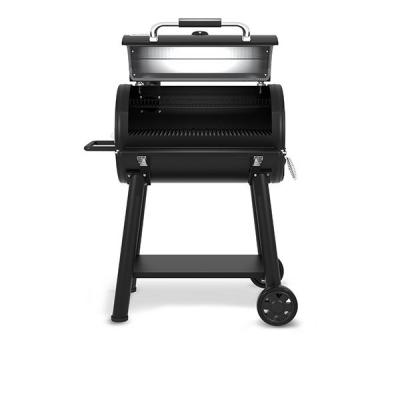The right grill is the difference between a perfect cookout and a grilling disaster. So, if you’re preparing for the upcoming smoky season, it’s always wise to plan two steps ahead and research which BBQ grill is best to invest in.
Of course, cooking outdoors is hardly a new tradition, as you’ll discover with the many BBQ types you can choose from. From the timeless appeal of charcoal BBQ to the innovative designs of pellet grills, there's a grill out there that’ll surely strike your fancy.
Whether you consider yourself a grilling connoisseur or at a point where you’re still picking up the basics, this guide will walk you through six different types of BBQ grills. We’re breaking down their pros and cons and sharing practical tips for choosing your first BBQ.
Propane

Over 70% of American households and 80% of homeowners own a BBQ grill. That’s 200 million people enjoying cooking outdoors with their family and friends.
Propane grills, also called liquid propane (LP) grills, use refillable propane fuel as a heat source for grilling.
Pros of Propane Grills
Propane grills are a smart option for those who want to enjoy hassle-free cookouts. Here are some advantages of this barbecue:
- Portable Grilling: Unlike gas, you can move propane grills around because they aren’t hooked to a natural gas outlet. This portability makes propane a great choice for renters or those who like to stay mobile while cooking.
- Affordable Setup: Propane grills are a budget-friendly option for those far from a main gas line. You won’t need any special setup to start grilling.
- Quick Heating: Liquid propane typically heats faster because of its higher BTU (British Thermal Unit) content. This fuel burns hotter than gas and can operate without electricity, making it the perfect companion for camp night.
Cons of Propane Grills
Here are some disadvantages to propane grills you may want to consider:
- Frequent Refills: While certainly portable, propane grills require frequent refills. A 25-pound liquid propane tank lasts about 25 hours of grilling session. After which, you’ll have to refuel.
- Safety Consideration: Propane is a heavy gas that won’t dissipate as quickly as natural gas. This makes propane-fueled barbecues a fire hazard, requiring careful use and storage.
Natural Gas

Gas BBQ grills are likely the most common type of BBQ in most households. Like propane, these grills are built like carts and connected to a natural gas supply line through a conversion kit.
Natural gas (NG) grills use pressurized methane liquid extracted from fossil fuels. It’s difficult to transport like propane and is distributed solely through underground pipelines.
Pros of Natural Gas
Are you thinking of getting a natural gas grill instead? Here are some advantages you can expect:
- Fire Safety: Compared to propane, natural gas is lighter and dissipates faster in case of a leak. This makes it less likely to pool in dangerous concentrations and cause accidental fires.
- Heat Control: Gas grills typically offer more temperature distribution control. This is thanks to the heat control knobs present in many natural gas BBQ setups.
- No Refills: Purchasing propane fuel whenever you’re in the mood for a barbecue can feel tedious. With natural gas, you won’t have to worry about running out of fuel mid-cooking.
Cons of Natural Gas
Below are some drawbacks about gas BBQ grills you may want to know:
- Upfront Cost: Setting up a natural gas grill can be expensive if you don’t have a natural gas hookup installed in your home. That said, natural gas also comes significantly cheaper than propane.
- Environmental Effects: All grills impact the environment. However, natural gas is generally considered worse since it uses methane, which releases more carbon dioxide into the atmosphere than propane.
Charcoal

Grilling meat with charcoal is one of the oldest cooking methods out there. If you enjoy doing it the traditional way, a charcoal grill may be what you’re looking for.
Charcoal BBQ grills come in many shapes and sizes. You use briquettes or charcoal lumps, which lend that infamous smoky flavor to your barbecue. Compared to other types of barbecue grills, charcoal is generally cheaper, both to set up and in terms of fuel.
Pros of Charcoal
Here are some reasons why charcoal remains a superb BBQ contender:
- User-Friendly Design: Charcoal grills are incredibly straightforward to use, even for beginners. You can grill directly over the heat or indirectly by pushing the charcoal to the side. They also double as a smoker by closing the lid.
- Moisture Retention: A charcoal grill’s heat is infrared. This reduces moisture loss during cooking, ensuring a tender, flavorful bite.
- High Heat Cooking: Albeit the simple setup, a barbecue grill can generate heat as high as 700 °F (371.11°C). So, you can most definitely cook a wide variety of food with it, including steaks and burgers.
Cons of Charcoal
If you’re thinking of getting traditional with your cookouts, here are some major disadvantages to charcoal you should know about:
- Messy Cooking: A charcoal grill could be a fantastic option if you don’t mind getting a little grease on the elbow. However, they do need more upkeep than most gas or propane setups.
- Less Precise Cooking: A charcoal grill may not be suitable for dishes that require precise temperature control and distribution. They’re also more difficult to ignite, especially for those new to grilling.
Electric

Those looking for the most convenient grilling experience shouldn’t look further. Electric grills are by far the most convenient and feature-rich barbecue companions. They’re tailor-made for those living in condos or apartments.
Pros of Electric
Here’s why you would want one of these handy machines:
- No-Frill Cooking: From igniting to setting temperature, everything comes easy with an electric grill. They heat up in a snap without fuel required.
- Low Footprint: Electric grills are the easiest to clean, as they don’t produce ash when like charcoal. They’re also more environmentally friendly than natural gas or propane, producing insignificant carbon dioxide.
Cons of Electric
An electric BBQ companion may sound heavenly, but here are some cons you may want to consider before getting one:
- Limited Heating: Electric grills heat up fast but usually don’t get as hot as the other barbeque types. Most models can only reach 400 °F (204.44°C) to 600 °F (315.56°C).
- Limited Flavors: These machines can certainly replicate restaurant-worthy food. However, one downside you may notice is they lack the same spectrum of flavors charcoal or gas grills offer.
Pellet

Pellet grills are the perfect combination of a smoker, an oven, and a griller. Instead of gas or charcoal, they use compressed 100% hardwood pellets as their heat source, adding tons of flavor and aroma to your food.
Whether you like it sweet, tang, spicy, smoky, or nutty, there’s a pellet fuel that’ll surely meet your sophisticated taste. Hickory is a popular pellet pick for its potent, smokiness all barbecue enthusiasts love.
Pros of Pellet
Flavors aside, here are other reasons pellet grills are worth investing in:
- Ease of Use: There’s no fire to tend to with a pellet grill, which cuts half the effort of grilling. Many models also have built-in thermometers and an automatic fan and pellet hopper.
- Quick Startup: Pellet grills heat automatically when turned on, allowing you more time to prep your food. In many brands, an indicator will tell you when the machine is ready for cooking.
Cons of Pellet
Of course, no grill is perfect. Here are some common complaints people have about pellet grills and smokers:
- Low Heating: Most designs have a maximum temperature of 400 °F (204.44°C), which may not be enough for high-heat dishes.
- High Initial Cost: Given its versatility, pellet grills are understandably more expensive than regular charcoal or gas grills. Prices typically range between $449 and $3,300.
Kamado

A Kamado grill is a Japanese-style ceramic charcoal BBQ grill. They’re also called “egg grills” and are a favorite among grilling aficionados because of their precise temperature control and versatility in the kitchen.
Pros of Kamado
Here are some of the reasons cookout lovers covet the Kamado grill:
- Multifunction Design: Egg grills are the definition of a multifunctional machine. Besides grilling, you can use the egg to smoke, bake, roast, sear, and even make soup.
- Smoky Meat: Unlike electric grills, a Kamado will lend that familiar smoky, flavored aroma to your food. You can also use different wood or charcoal fuels to achieve unique flavors to your liking.
- Dynamic Heating: The airtight design provides precise temperature control. You can easily maintain a temperature of 212 °F (100 °C) for several hours without refilling your fuel.
Cons of Kamado
There’s practically no drawback to having a Kamado grill. But if we’re nitpicking, you may want to know the following:
- Quite Pricey: All those benefits come at a certain price. If you’re eyeing a Kamado grill, be prepared to spend around $800 to $1,000.
- Steep Learning Curve: A Kamado grill may be difficult to learn for BBQ beginners. It usually requires a few trials and errors to master the machine.
Conclusion: How To Choose Your BBQ Type?
Choosing a BBQ depends on several factors. Besides the cost, consider the space available in your home. If you have small or no outdoor space, an electric grill could be your best option.
Then think about the flavors. If you’re looking for that chargrill flavor, a charcoal or Kamado grill is right up your alley.
Finally, ask yourself how much time you’re willing to invest in cooking. If you prefer efficiency and convenience, gas, pellet, and propane are the quickest ways to enjoy a meaty bite.

